Walter
RAM ProMaster
136″ WHEELBASE, HIGH ROOF
Camping on your own can be intimidating, especially for women. Besides the normal excitement and nerves that come with heading out alone, women often face the added pressure of challenging cultural norms.
If you’ve ever camped, traveled or lived alone, chances are you’ve heard unhelpful comments like:
While those remarks might come from a place of concern, they give us the ick. All women should be welcomed, encouraged and normalized as capable and confident solo campers.
Let’s dig into some of our top tips to help you approach your next (or first) solo van camping trip with confidence.
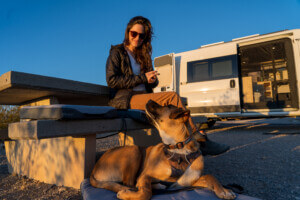
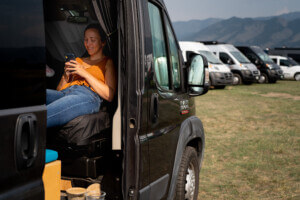
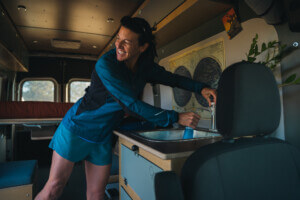
Name It and Tame It
This phrase pops up in all kinds of self-help content, and for good reason. It’s a simple but powerful way to handle emotions like fear, and it works for solo van camping too!
Start by naming what makes you the most nervous. Is it strangers? Wildlife? Van trouble? Getting Lost? Whatever it is, once you identify the source of your unease, you can start taking steps to tame it.
For example, if your biggest fear is other people, or as one woman on our team put it, “my biggest concern is always the possibility of encountering weirdos who could harm me,” you can start by creating perspective. Talk it through with a friend, or journal about how being outdoors doesn’t automatically make you more vulnerable. Remind yourself that if someone or something feels off, you’re never being “dramatic” for leaving. Trusting your gut is a survival skill, not an overreaction. You can also build confidence by taking a women’s self-defense class or exploring options for additional personal safety like alarms or personal protection – we’ll cover that more in depth later on too!
If your biggest fear is animals, you can rest assured that most wildlife wants to avoid you as much as you want to avoid them. You can reduce your risk by learning about the local wildlife in the places you travel, and learn how to safely store food and gear. Signing up for a wilderness first aid course or learning how to use bear spray are great practical steps you can take as well to feel more prepared and at ease.
If you lose sleep over the idea of vehicle trouble in a remote place, there are plenty of proactive steps you can take to rest easier. Learning the basics of van maintenance: checking fluids, changing a tire, jumping a battery, can go a long way to making you confident and competent. Consider taking a basic car care class at a local shop, or through the university of YouTube videos. You can also increase your peace of mind by carrying an emergency kit, signing up for a roadside assistance plan and downloading offline maps. Knowing you have a plan to handle whatever the road may throw at you can help turn anxiety into self-assurance.
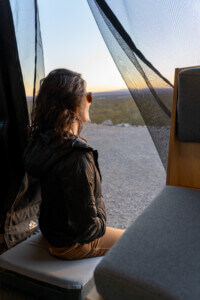
Grow Into It
If solo camping is a new adventure for you, ease into it instead of diving in headfirst. Start by getting comfortable spending time alone in everyday settings. Some ideas could include treating yourself to a solo meal at a favorite restaurant, enjoying a quiet coffee shop session or catching a movie by yourself. Take day trips for hikes and lunch in the van, or even try your first solo overnight in your driveway.
With each small adventure, your confidence will grow, and so will your comfort with going it alone.
Plan Ahead
When you’re ready to go out on your first overnight trip in the van, spend some time doing your homework to set yourself up for success.
Choose a campsite that suits your style. Do you feel more comfortable with the peace and quiet of boondocking, or do you prefer staying close to fellow campers at a paid campground? Apps like the Wayfarer app are great for scouting spots and reading reviews to find your ideal setup.
And don’t forget to have a backup plan. If your first choice is occupied or your trip is running longer than expected, having a few alternate spots in mind will make your trip less stressful.
Beyond choosing a campsite, there are a few other key ways you can make sure you are prepared:
Set Up A Smart Camp
When you arrive at camp, there are a few small things you can do to not only increase your comfort and confidence, but also help keep you safer.
First, try to arrive at your campsite during daylight so you can get a good lay of the land. Use window covers to keep prying eyes from peeking inside your van, and always lock your doors before you go to bed.
When parking, position your van so you can drive out quickly if you need to leave in a hurry. Keeping your driver’s seat clear and turned forward, and storing your keys within easy reach, will help you pack up and move fast if the need arises.
Let’s keep it real – the odds of you needing to pack up and leave in the middle of the night are extremely rare. We personally haven’t had to do this, and hardly ever hear of other female Wayfarians needing to do this. But having that option is empowering, and knowing it’s there can help you rest easier with peace of mind.
You can also create the illusion of a companion. Setting up two camp chairs and an extra water bottle on your picnic table can make it seem like you’re not traveling solo. Hang a second towel to dry, play a podcast, or casually mention a partner or friend that you are expecting if you end up chatting with a stranger who gives you a weird vibe. These little things can be enough to deter unwanted attention and make you feel a bit more secure.
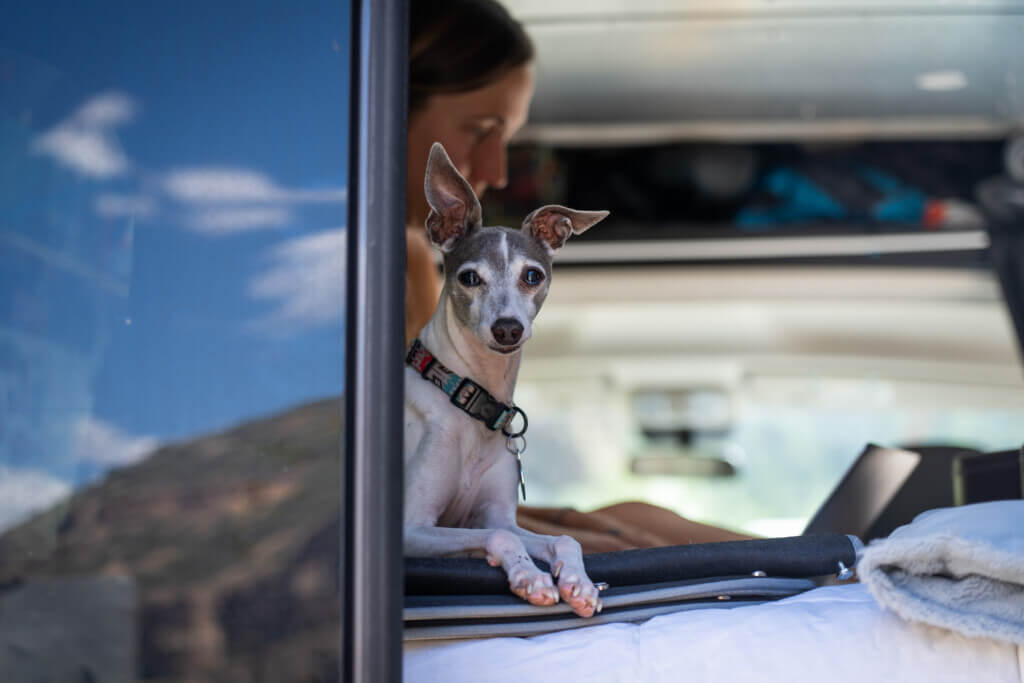
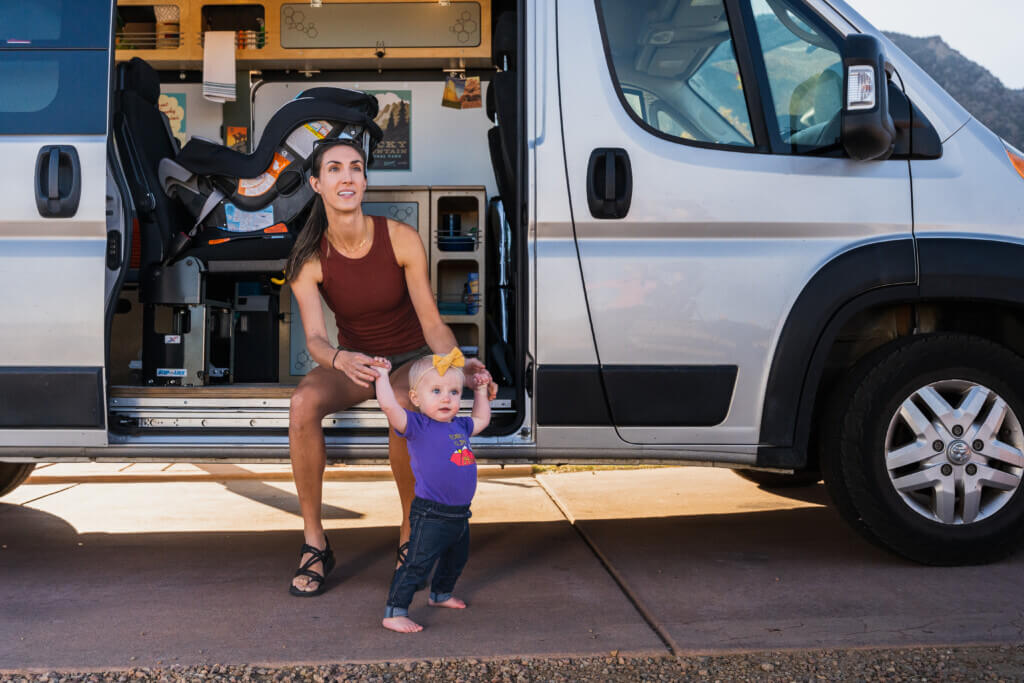
Stay In Touch
Staying connected to trusted friends or family helps bring peace of mind when you’re out exploring, especially in remote areas. Make sure you have a reliable way to communicate, even if there is no cell service. A satellite communicator like the Garmin inReach is a great backup to have, just in case.
It’s also a smart idea to share your travel plans with someone you trust. Give them a rough itinerary and let them know when they should check in or reach out for help if they haven’t heard from you. You can even share your phone’s location so they can follow along with your adventure from afar. These small steps can go a long way in helping both you and your loved ones feel more at ease during your solo travels.
Let’s Talk Safety Gear
The steps we’ve covered so far may be all you need to head out on your own and feel secure. But for those who feel the need for extra safety gear, there are plenty of options to explore.
Self-protection – Comfort levels vary, and we’re not here to tell you what’s right for you. Some solo travelers feel better having a form of self-defense, whether it’s pepper spray, bear spray, wasp spray, a knife or even a firearm. Whatever you choose, make sure you’re confident in how to use it and understand the laws in each state or country you visit. And if kids or pets may have access to your van, secure storage is an absolute must!
Cameras and alarms – A few added security devices can go a long way in boosting peace of mind. We won’t recommend specific brands, because there’s always something new hitting the market, but here are a few categories to consider:
None of these are required for every solo camper, but if any of it helps you feel more prepared and protected, then that is a great option for you. And while we’re at it, if you’ve been thinking about adopting that giant German Shepherd mix, consider this your official encouragement. We fully support the guard dog option too.
Trust Your Instincts
You’ve navigated life with a 100% success rate so far. Trust that you’ve got what it takes to be a smart, and capable camper. Stay tuned in to your instincts, keep a positive mindset, and don’t forget to have fun along the way.
You don’t need to be fearless. You just need to be prepared.
You’ve got this and we’re cheering you on every mile of the way. Have a tip or story from your own solo travels? We’d love to hear it.